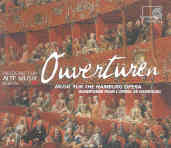There isn’t a more enjoyable or entertaining disc of Baroque music available from anyone, anywhere. The Akademie für Alte Musik Berlin has put together an absolutely delicious program of overtures and suites by composers associated with the Hamburg opera, ranging in date from 1693 to 1726, and what a marvelous and varied assortment it turns out to be! The earliest work here is by Philip Erlebach–an overture in the French style after Lully–and while the music can’t be called outstandingly original, it is gracious and pleasant, and more to the point, the performance makes it sound like a masterpiece. With an orchestra consisting only of strings, flutes (omitted from the personnel list in the booklet for some reason), oboes, bassoons, percussion, lute, and harpsichord, the ensemble makes some truly enchanting sounds. The extensive (also unspecified) percussion instrumentarium, full of curious but tastefully improvised sounds and rhythms, alongside characterful contributions from the two continuo players, are a constant source of delight both in this work and throughout the program.
Schürmann’s suite from Ludovicus Pius is quite substantial, beginning with a large overture followed by a remarkably well-developed quick minuet. Perhaps the most interesting movement is the aptly entitled “Staccato”, but there are also two brief ballets before the energetic concluding gigue. Handel’s first (1705) opera, Almira, might not fully anticipate the mastery to come, but even at this stage he had a characteristic style, as the rollicking concluding ritornello of this suite surely proves. Reinhard Keiser wrote tons of operas for Hamburg, one of which (Croesus) Harmonia Mundi has already issued. His four-minute overture to Le Ridicule Prince Jodelet packs more material into its brief span than most composers manage in twice the time. It’s a pip.
The program concludes with Johann Christian Schieferdecker’s Premier concert from his Concerts musicaux (1713). Schieferdecker is best known today as the only composer desperate enough for Buxtehude’s job in Lübeck to be willing to marry his less-than-attractive daughter in order to get it. Given that composers as famous as Handel and Telemann reportedly fled in horror at the very prospect, Schieferdecker hasn’t come in for much praise, but this suite, brief though it is (five short movements), brings the program to a truly beautiful conclusion on account of its gorgeous final chaconne. Full of captivating rhythmic invention and soulful harmony, it would make a fantastic filler for radio stations and could well become yet another baroque hit. Certainly in this sensual performance, with authentic strings far sweeter than those found in, say, the Freiburger Barockorchester, it makes the best possible impression. The sonics also are fully up to the very high standards of the house. This is a true “feel good” disc, guaranteed to enliven sleepless nights and rainy days. [4/30/2005]
































